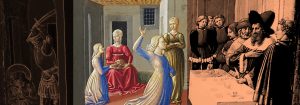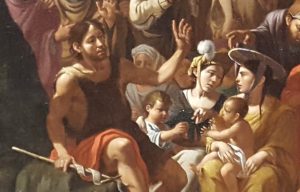Reading the Gospel of Mark 6:14-29
“…and yet he liked to listen to him…”
The reading of Mark 6:14-29 is included in the revised common lectionary provided by the Vanderbilt Divinity Library. The text is from the NRSV. You can hear a recording of this passage here.
Reading the Gospel aloud invites the audience to experience human encounters with the divine as revealed in the Bible. We can leave interpretation and meaning to members of the clergy and other scholars. What we are most interested in as lay readers are the human experiences discovered in the narrative.
First Impressions
This passage from Mark is largely a flashback that happens through the mind’s eye of Herod. It seems remarkably contemporary in that way. Herod’s inner thoughts and feelings are revealed and have a dream-like quality in terms of the speed with which the flashback unfolds. These memories are vivid flashes.
The action is rife with political power and intrigue. We’ve moved from the bucolic to the urban; from the active mission work of Jesus and his disciples in the field – in the service of others — to the decadent appetites and tests of absolute power in the court of Herod.
The reading releases a chaotic mashup of dark human passions and emotions. There is grievance. Anger. Resentment. Grudge. Fear. Guilt. Fascination. Sensuality. Desire. Cynicism. Superstition. Revenge. This is a scene of human excess that culminates in reckless promises and wanton cruelty.
Herod is conflicted and has an overwhelming desire to indulge himself — he both fears John the Baptist and is drawn to him at the same time — and to please others in his court. He’s already taken his brother’s wife and now seems to be indulging his daughter in an inexplicably extravagant way… Ultimately, he must save face with a swift and brutal exercise of absolute power over one who is powerless.
Herod and his wife make their child the tool of their separate agendas: he foolishly makes an oath and she manipulates the girl into making a gruesome demand. Herod is forced to give something he never anticipated giving. Would even half his kingdom have been better?
It all comes back to haunt him in a rush.
Finally, the reading foreshadows the murder of Jesus yet to come and the reclaiming of his body by disciples at the tomb. This reading is a vision of past and future political horror.
Text Analysis
Here are some key words and phrases from the reading that offer insight into the subtext and that we want all who listen to hear clearly.
- ”Jesus’ name had become known” [to Herod.] Sometimes it’s better to fly under the radar. This has ominous overtones.
- “Prophet.” Is the word more sneered than revered? A prophet is the one who told Herod: “It is not lawful for you to have your brother’s wife.”
- “Herod himself had sent men who arrested John, bound him, and put him in prison.” Even though Herod is reported to have done this “himself”, he in fact sent other men to have John arrested and imprisoned. There is a level of cowardice and detachment in the exercise of institutional violence that is chilling.
- Herod’s wife holds “a grudge” against John and “wanted to kill him.” Contrast this murderous desire to (seemingly personally) kill John to Herod’s more passive arrested-by-others.
- “Herod on his birthday gave a banquet” Herod is throwing himself a party.
- Herod has avoided having John killed, because he both fears John and “he liked to listen to him.” Herod protects John but also seems to regard John as a dangerous amusement, a plaything, a pet prophet he keeps like a lion in a cage.
- “Ask me for whatever you wish, and I will give it.” This is a display for the guests more than a gift to his daughter. The implication is that Herod is empowered to grant WHATEVER someone may wish: with almost God-like authority. This is a claim to absolute power. Was there ever a more narcissistic, ill-considered and fateful oath?
- “…the head of John the Baptist on a platter…” This is absolutely ghoulish coming from the mouth of his daughter.
- “When his disciples heard about it, they came and took his body, and laid it in a tomb.” This simple action is subdued, dutiful, and reverent. Again, in stark contrast.
This scene is reminiscent of all of the excesses of the premium television soap operas of today: Game of Thrones, The Sopranos, The Borgias. It is repulsive, yet fascinating at the same time.
Reading aloud
Here’s how I would approach reading this passage aloud. That’s not to say that this is the only or the best approach for you. This is what I hear. You may hear other qualities at work. But the reading affords the weaving of a rich vocal tapestry which should not be missed.
It begins with in a rush of whispers and rumors. The inner dialogue of Herod is quiet and ruminative in contrast to the lurid events that will be recounted. The voices over-articulate to be clear, but are sotto voce. At court there’s always the danger that someone is listening.
Then comes the flashback. There is an evocative, dreamlike or séance-type quality to this reading. It’s the retelling of a horror story. It’s about the possible raising of the unjustly dead, not in celebration but in vengeance. The action is swift and brutal.
The announcement of a banquet is expansive and the dignitaries in attendance duly noted.
Herod’s daughter, Herodias, dances. The nature of this dancing is left to the imagination. So we need to allow the imagination to work.
She’s taken advantage of at the same time she is indulged. Herod is performing for his audience. Is there a note of the disingenuous in his voice?
We then witness the impulsiveness of a child – a child who is used to getting what she wants no matter how outrageous the request. She is breathless. Was the platter her mother’s idea or her own perverse twist? Is she herself shocked or amused? There is the slightest pause before “on a platter.”
The collection of the body of John the Baptist is solemn and ghostly.
This peek into Herod’s inner life, family dynamics and his relationship to his people is the antithesis of Jesus. It is the portrait of a shepherd who eats his own flock. Like any horror story, the effect is intended to be shocking.
What do you hear in this Gospel passage?


